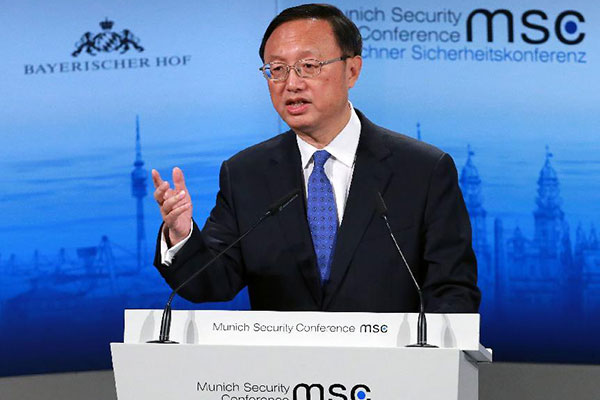China and the newest world order
- By Tim Collard
 0 Comment(s)
0 Comment(s) Print
Print E-mail China.org.cn, February 16, 2015
E-mail China.org.cn, February 16, 2015
|
|
|
State Councilor Yang Jiechi speaks at the opening panel of the 51st Munich Security Conference (MSC) in Munich, Germany, Feb 6, 2015. China called for fostering a vision of a common, comprehensive, cooperative and sustainable security, said Yang Jiechi in Munich. [Photo/Xinhua] |
The world has entered a fast-moving period in its turbulent history. Even the most insightful and experienced diplomatic analysts can hardly be blamed for finding it difficult to keep up with events.
Last year, in particular, was a troublesome one, with the imbroglio in Ukraine calling into question the whole territorial settlement emerging after the collapse of the Soviet Union; then, there is the sudden and alarming rise of the extremist entity calling itself the Islamic State.
China, although always preferring to avoid interfering in affairs outside her own region, has found this hard to maintain given its position as a permanent member of the UN Security Council and a growing network of international relationships.
On February 6, at the regular Munich Security Conference, State Councillor Yang Jiechi set out China's views and policies on the current security challenges. He was supported by Ambassador Qu Xing, the former President of the China Institute of International Studies. As usual, the senior man laid out the guiding principles, while his colleague offered detail.
Yang Jiechi placed the world's current turbulence in the context of the period since the victorious end of the war against fascism in 1945, which helped preserve a sense of proportion; it cannot be denied that the overall picture since then has been mainly positive. China, as a responsible leading member of the international community, was prepared to play a leading role in promoting sustainable cooperative security, he pledged.
However, this could only be achieved by "working to improve people's lives, narrowing the gap between rich and poor, promoting common development of all countries and ensuring sustainable development." Everyone accepts that the only real guarantee of security is common economic progress and development. Yet, as the English saying goes, "the devil is in the detail" and this was Ambassador Qu Xing's job.
The approach was largely dictated by the conference theme: "The Collapse of the International Order" - strong words, but true. In an interview with Xinhua on the margins of the conference Qi argued that, "the end of the Cold War does not mean the end of the post-World War II global settlement."






